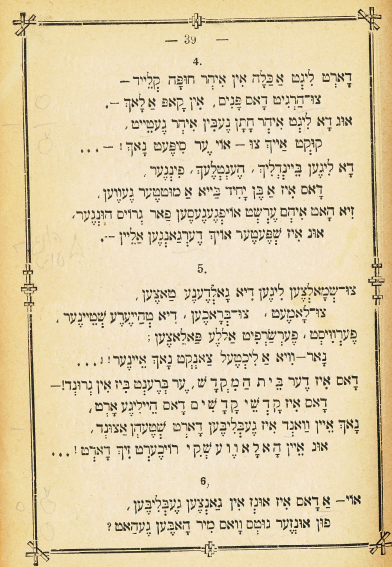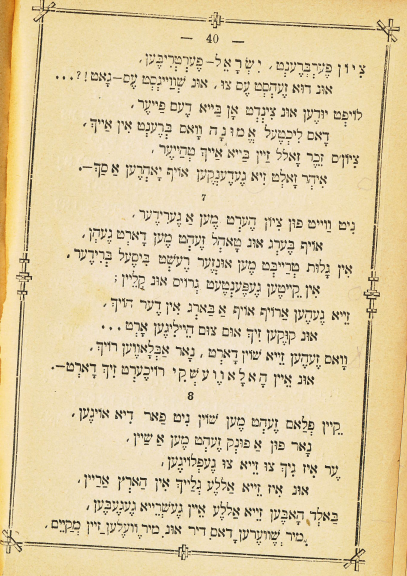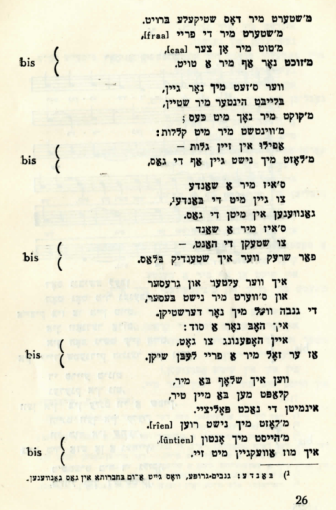Ver s’hot nor in blat gelezn: Der Bialystoker pogrom
Whoever has Read the Newspaper: The Bialystok Pogrom
Performance by Frahdl Post, Recorded by Wolf Younin 1970s.
This week’s song was submitted by Henry Carrey. The singer Frahdl Post is his grandmother, the mother of a previously featured singer, Leah Post Carrey (aka Leyke Post). Frahdl was born in Zhitomir, Ukraine in 1881 and died at the Workmen’s Circle Home for the Aged in the Bronx in 1976.
Carrey writes:
“Frahdl Herman Postalov, a/k/a Fannie Post, grew up in Zhitomir, Ukraine in a lower middle-class home, one of four sisters and two brothers. Her father Dovid-Hersh Herman had a shop where grain was sold. His wife, Rivke Kolofsky worked in the shop.

Frahdl Post
As a young girl, she always like to sing and dance and took part in amateur theatricals. Performing ran in the family. Her father was a part-time cantor with a pleasant voice and Frahdl and her brother Pinye teamed up to perform at local parties. She told us that she learned her vast repertoire of many-versed songs by going to a store with friends every day where newly written songs would be purchased and then shared by the girls. She also used to stand in the street outside the local jail and learn revolutionary songs from the prisoners who could be heard through the windows. She remembered attending revolutionary meetings in the woods, and singing all the revolutionary songs, although she herself was not an activist.
One day she went to a fortune-teller who told her that her future husband was waiting at home. When she got home, she saw my grandfather, Shloyme, who had been boarding with her aunt. In 1907 they married and within a year her husband Shloyme was off to America to seek his fortune leaving a pregnant wife. Frahdl and my mother Leyke left to join him about four years later in 1913.
Eventually she got to Halifax, Nova Scotia but was denied entry to the US because she had a highly contagious disease called trachoma. Fortunately, she was somehow allowed into Canada instead of being sent back to Europe as was customary. After four months of treatment in Montreal , Frahdl was cured and they left for Boston, where my grandfather had settled. Frahdl had two more children Rose and Hymie in the next three years.
During the 1920’s, Shloyme decided to move from Boston and start a tire business for Model-T’s in Arlington – a suburb of Boston where there were only three other Jewish families. However, my grandmother still took the tram into the West End of Boston to buy most of her food. Understandably , the children were influenced by the non-Jews around them and once brought a “Chanukah Bush” home and put up stockings on the mantel. My grandmother threw the tree out and filled the stockings with coal and onions from “Sente Closet”. My mother, Leyke, who even at a young age was a singer, had been secretly singing with the Methodist choir. One day the minister came to the door to ask my grandmother’s permission to allow my mother to sing in church on Christmas Eve. That was the last straw for my grandmother and they moved back to the West End.
My grandmother always sang around the house both the Yiddish and Ukrainian folksongs she had learned in Zhitomir and the new Yiddish theater songs she heard from other people or later on the radio and on recordings. All the children learned the songs and Leyke incorporated them into her repertoire when she became a professional singer.”
Commentary by Itzik Gottesman:
The song Ver s’hot nor in blat gelezn describes the Bialystok pogrom which occurred on June 1, 1906. Two hundred Jews were killed and seven hundred wounded – a particularly violent pogrom.
A number of verses are similar to other pogrom songs. The same song but only five verses long, with a reference to a pogrom in Odessa (1871? 1881? 1905?) is heard on Ruth Rubin’s Folkways album The Old Country and is printed in the YIVO collection Yiddish Folksongs from the Ruth Rubin Archive sung by Mr. Persky of Montreal. We have attached two scans of the song as it appears in the book, words and melody.
Click here for a previous posting about another song about pogroms (including Bialystok).
There it is noted that “The song is folklorized from a poem by Abraham Goldfaden, Di holoveshke (The Ember). I find only the third verse of Goldfaden’s poem to be adapted in this song. Three scans of Goldfaden’s original poem are attached as they appear in the 1891 edition of Dos yidele. In Post’s version it is the fifth verse.
In the Frahdl Post recording, the 10th verse ends abruptly before the song’s conclusion. Fortunately, Henry Carrey was able to add the last verse (and an alternate line) based on other recordings of his grandmother, so the transcription and translation include this final verse but it is cut off in the audio recording.
Wolf Younin (1908 – 1984), who recorded this song, was a well-known Yiddish poet, lyricist (Pozharne komande, Zing shtil, Der yid, der shmid, Ober morgn) and journalist. His column Shprakhvinkl included much Jewish folklore. Younin’s NY Times obituary is available here:
Thanks to Henry Carrey for this week’s post. The transliteration is based on his version. I changed some words to reflect her dialect.
TRANSLITERATION
Ver s’hot nor di blat geleyzn
Fun der barimter shtot Bialistok
Vos far an imglik dort iz geveyzn
In eyne tsvey dray teg.
Plitsling, hot men oysgeshrign,
“Shlugt di yidn vi vat ir kent! “
Shteyner in di fenster hobn genumen flien.
A pogrom hot zikh oysgerisn in eyn moment.
Blit gist zikh shoyn in ale gasn,
In se shpritst zikh shoyn oyf di vent.
Yidn hot men geharget, oysgeshlugn.
Mit zeyer blit hot men gemult di vent.
Dort shteyt a kale oyf di harte shteyner,
Ungetun in ir vays khipe-kleyd
Un leybn ir shteyt a merder eyner
un er halt dem khalef in der hant gegreyt.
Dort ligt a froy , a yinge, a sheyne,
farvorfn, farshmitst ligt zi oyfn mist.
Leybn ir ligt a kind a kleyne;
zi tit ir zoygn ir toyte kalte brist.
Vi zey zaynen nor in shtub arayngekimen,
un zey hobn di mentshn git gekent.
Vus iz geveyn in shtib hobn zey tsebrokhn.
Di mentshn upgeshnitn hobn zey di hent.
Vi zey zaynen nor in shtub arayngekimen,
Mit ayn tuml, mit a groysn rash.
Vus iz geven in shtub hobn zey tsebrokhn,
Kleyne kinder arupgevorfn funem dritn antash.
Ver s’iz baym umglik nisht geveyzn
Un er hot dem tsorn nisht gezeyn.
Mentshn hobn geshrign “Oy vey un vind is mir”.
Aroysgelozt hobn zey a groys geveyn.
Vi men hot zey in hospital arayngebrakht,
Keyner hot zey gor nisht derkent.
Mentshn hobn geshrign “ Oy, vey un vind is mir”.
Zey hobn gebrokhn mit di hent.
Oy, du Got, [Recording ends at this point ]
Oy, du Got du bist a guter,
Far vo’zhe kukstu nisht fun himl arop ?
Vi mir laydn shver un biter
[Or alternate line: Batrakht zhe nor dem yidishn tuml]|
Farvos dayne yidn, zey kumen op.
TRANSLATION
Who has not read in the papers
Of the well-known city Bialystok
Of the tragedy that befell it.
in a matter of three days.
Suddenly someone cried out
“Beat the Jews as much as you can!”
Stones thrown at windows started flying
A pogrom erupted in one moment.
Blood already flows in all the streets
And is spurting already on the walls.
Jews were killed and beaten
With their blood the walls were painted.
There stands a bride on the hard stones
Dressed in her white bridal gown.
Next to her stands a murderer
And he holds the knife ready in his hand.
There lies a woman, young and beautiful
Abandoned, tortured, she lay on the garbage,
And next to her lies a small child
She nurses it from her dead, cold breast.
As soon as they entered the house
And they knew the people well,
Whatever was in the house they broke
The people’s hands they cut off.
As soon as they came into the house
With noise and violence
Whatever was in the house they broke;
Small children were thrown down from the third floor.
Whoever was not at this tragedy
Did not see this great anger.
People yelled “O woe is me”
Letting out a great cry.
When they brought them to the hospital
No one could recognize them.
People cried out “Woe is me”
And wrung their hands .
Oy God [recording ends here but should continue with…]
Oy God you are good
why don’t you look down from heaven?
How we suffer hard and bitter
[alternate line: “Look upon this Jewish chaos”
Why your Jews are so punished.



Ver es hot in blat gelezn (From YIVO publication Yiddish Folksongs from the Ruth Rubin Archive):


Abraham Goldfaden’s poem Di holoveshke (The Ember), published in Dos yidele (1891)











 Image of Borukh Shulman published in S
Image of Borukh Shulman published in S































